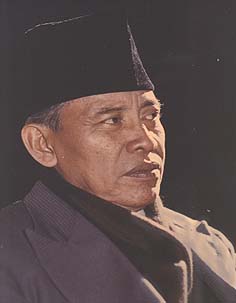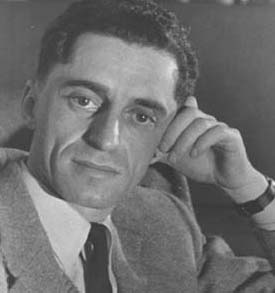 Subud was founded by R.M. Muhammad Subuh Sumohadiwidjojo (1901 - 1987). Of
noble Javanese descent Pak (a common Indonesian reverential name for father)
Subuh went through a series of deep inner changes. In it he received what he
termed the "Great Life Force", a manifestation of the Power of God.
He received that he had been given this Power to transmit to anyone who asked
for it in all sincerity. The inner contact received would lead that person
eventually to a communication with his divine nature. He/she in turn would be able
to transmit this contact (called: opening) to someone else at a later stage, etc.
Subud was founded by R.M. Muhammad Subuh Sumohadiwidjojo (1901 - 1987). Of
noble Javanese descent Pak (a common Indonesian reverential name for father)
Subuh went through a series of deep inner changes. In it he received what he
termed the "Great Life Force", a manifestation of the Power of God.
He received that he had been given this Power to transmit to anyone who asked
for it in all sincerity. The inner contact received would lead that person
eventually to a communication with his divine nature. He/she in turn would be able
to transmit this contact (called: opening) to someone else at a later stage, etc.The small groups that grew around Pak Subuh were combined after the war under the name of Subud Brotherhood. It reached the West in a remarkable way. Pak Subuh had told years before that an Englishman, who spoke many languages, would come and bear the torch to other countries. His prediction came true in 1950 at a time that Java was immerged in a struggle for freedom.
 |
Hardly any foreigner was allowed to enter the sultanate of Yogyakarta in Central Java, where Pak Subuh, also affectionately called Bapak (= father), lived. Yet, by a series of coincidences an English linguist, Husein Rofé (1922 - 2008), found himself in Yogyakarta in 1950. There he met Pak Subuh. He became convinced of his spiritual gifts and asked to be opened. The results were so impressive that he decided to devote himself to the spread of this inner contact.
He commenced a number of groups in Indonesia and later in Japan, Hong Kong, and Cyprus. In the latter group both Greeks and Turks participated, although the island was torn by conflicts between these sections of the population.
In 1957 Rofé met John G.Bennett who had a number of groups all over the world working along Gurdjieff's principles. Bennett remembered that Gurdjieff had intimated that one should watch for a teacher to come from the Dutch East Indies.
 |
Bennett was so impressed by the state of consciousness that could be reached through the latihan in a short time that he advised his groups to test it.
(Photo Bennett at Subud Congress in Amersfoort, Netherlands 1963)
Subud has spread all over the world since. Yet, little is known about it as Pak Subuh indicated that Subud ought not be spread by any form of propaganda. Persons who are ready for it will be drawn to Subud members, or be presented with an opportunity to come in touch with a group.
What Subud is and is not
Subud is not a teaching; it does not have a ritual, nor a teacher. It is open to members of all races and beliefs. Pak Subuh being brought up in a Javanese mystical tradition has explained the process of inner receiving in terms of his own culture. An exposition in line with our present-day state of knowledge about man and the world he lives in is left to the members.The process evoked by the latihan brings Subud members an inward view of their own nature, makes them understand their fellowman better. It brings them in a state of mind in which they can see clearly the right decisions to be made and the proper course to follow. Thus it will help to develop a different meaning to their lives and a deeper insight into their religious or spiritual believes.
The latihan
Subud is based on the experience that man can open himself to a divine power that can heal and purify him. At the centre of Subud activities is the practice of a spiritual exercise, the latihan. In it members give free expression to a process of purification. Tensions in body and mind will disappear resulting in an inner harmony permeating their being. In this state of wholeness a deep inner communication takes place. A silent prayer takes over dependent on the ability to surrender and yield to the spiritual life force. Eventually it will result in a regeneration of being, a wholeness of the fractured self, leading to a deeper spiritual life in tune with the Infinite.Although countless other benefits - material, physical and mental - have been reported, a warning is given not to be guided by expectations.
Subud lays no claim on the individual. The object is not Subud, but man himself. Subud is an association of people dedicated to the wish to be guided from within. Its members will gain as much from Subud as they devote themselves to the art of living and receiving from within. The latihan will be instrumental in accomplishing this. It releases tensions continuously. After a latihan she/he will feel free - fresh to undertake anew the tasks on hand.
Membership
For a deep-going purification an inner stability is required. Therefore Subud is not open to everyone. Psychiatric patients are not advised to take part. Applicants should not be addicted to drugs, or alcohol. A member is expected to stand on his own feet - contribute to, instead of lean on the group.Normally a waiting-period of three months is observed before a person can be opened. In this period of time the applicant's possible questions will be answered and he/she may meet members of the group. This is also a time for him/her to come to a definitive decision to be opened.
As pointed out, the results are strongly dependent on the way the individual is prepared to apply what is received by him in Subud to his daily activities. Pak Subuh has emphasized strongly that contact with our fellow man in our jobs, enterprises, duties, studies, art, etc. present the primary challenge to show and develop inner receiving. He has encouraged members to start enterprises together. A number of them exist, as do Subud charitable institutions all over the world.
Literature (See also available literature link below):
- Bennett, J.G.: Concerning Subud (New York 1959)
- Geels, Antoon: Subud and the Javanese mystical tradition (Curzon Press,Richmond,UK,1997)
- Longcroft, H.: History of Subud (1901-1959)
- Lyle, Robert: Subud (UK 1983)
- Rofé, Husein: The Path of Subud (Berkeley 1988)
- Subuh, Pak Muhammad Sumohadiwidjojo: Susila Budhi Dharma (1956)
- Subuh, Pak Muhammad Sumohadiwidjojo: Autobiography (UK 1990)
- Sullivan, Matthew B.: Living Religion in Subud (UK 1991)
- Week, Istimah: The Man From The East (N.Y. 1996)
Links:
- International Contacts Page
- International Subud websites (Subud Portland)
- World Subud Association
- Subud Indonesia
- Subud USA
- Subud Life.com
- Subud World News Contact information
- A belorussian translation of the above article
- What Subud means to me: Members' stories
- Subud Voice
- Subud Books on-line
- Commemorative site Pak Subuh Centennial
- A tribute to Husein Rofé
- Subud Netherlands site
- Available literature UK
- Home-page UK
- SICA - Subud International Cultural Association
- A commentary of Husein Rofé on Pak Subuh's 'Susila Budhi Dharma'
- A mysterious encounter of Dutch painter Auke Sonnega with Husein Rofé on Bali in 1950
- Audio clips of people connected with the history of Subud
- Wikipedia on Subud
- The art of living
- Susila Budhi Dharma (Subud) and its doctrines” by Chuzaimah Batubara.
- Javanese mysticism
Video clips:
- Husein Rofé in Hong Kong 1955
- Pak Subuh visits Puncak mountain resort on Java in 1955
- Pak Subuh in Tokyo 1959
- Pak Subuh visits the Netherlands 1964
- Pak Subuh talks in Eindhoven, Netherlands 1964
- Pak Subuh in the Hague, Netherlands 1964
- Pak Subuh's leaves the Hague on world tour 1964
- Pak Subuh in the Hague 1967
- Subud members have a crazy evening in the Hague 1967
- Sydney 8th World Subud congres in 1989
- Subud National congress in Rambach, Germany, in 1974
- Subud 5th World Congress in Wolfsburg, Germany, in 1975
For further information please apply to the group nearest to you by checking the links above. Otherwise by sending an email to
For dutch readers:
For those who understand Dutch: Ook in Nederland bestaan groepen. Voor een nederlandse inleiding, adressen en verdere informatie klik op: website Subud Nederland"Subud®" and the seven circles symbol are registered marks of the World Subud Association.
© text, photo's and video clips: Michael Rogge 2011. (Email address: manandu@NOSPAMxs4all.nl , delete 'NOSPAM' from the address.)
Latest revision date: 13 Oct. 2011
Retrieved from: http://wichm.home.xs4all.nl/subud1.html
No comments:
Post a Comment